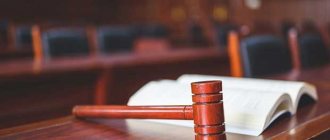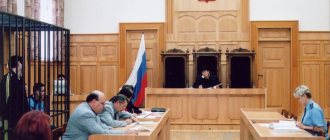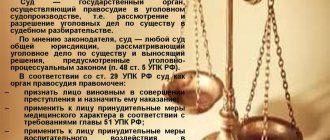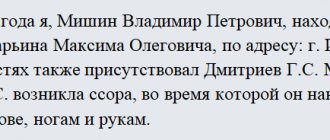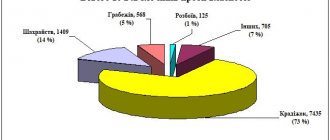Hi all! In this article we will talk about who the participants in criminal proceedings are. This small topic is included in the codifier of KIM Unified State Exam topics in society 5.16 “Features of the criminal process.” For example, they like to insert this topic into task 28, in which you need to plan a report. Yes, and in other tasks she can appear. Therefore, if your goal is maximum scores, then you need to study it.
So, let's go. First, we will briefly name and characterize the participants, and then describe their role.
Participants in the proceedings
The Code of Criminal Procedure, on the basis of the articles included in it, considers each of the parties to the process and establishes the current procedures and rules of conduct during the proceedings. Each of the participants has a definition and a specifically assigned function by the legislator during a court hearing.
The concept and classification of participants in legal proceedings is also established by the Code of Criminal Procedure.
Based on the current articles prescribed in the Code, all citizens, companies and government agencies registered in the country can become participants in such proceedings. Important! It is worth paying attention to the fact that participants may appear during the proceedings at the request of each party.
Therefore, the legislator proposes an expanded list of persons who may be present at the court hearing. The concept and classification of participants in criminal proceedings determines that the following parties may be admitted to the court specifically for the established proceedings:
- accusation;
- protection;
- neutral persons not related to a particular party who act as experts, etc.
Moreover, this list is divided into specific persons with their main responsibilities, rules of action and functions in a particular proceeding.
Prosecution
Participants in criminal proceedings on the part of the prosecution are represented by citizens who have a certain status prescribed in the Criminal Procedure Code.
On the basis of this, all persons are divided into specific subjects of legal relations that arise when considering the case on its merits. The rights and obligations of participants in criminal proceedings in accordance with current regulatory legal acts and decisions are regulated by the court hearing. They must be fully protected and observed on the basis of the current articles of the Code of Criminal Procedure.
This is interesting! What are the statutes of limitations for criminal prosecution?
The prosecution may include:
- The prosecutor, as a participant in criminal proceedings, is responsible for the implementation of all established norms and monitors their implementation during the court hearing on a specific case. He is an active party who also has the status of a state prosecutor. The prosecutor must fully comply with the procedure and regulations of the prosecution established on the basis of the current articles of the Code of Criminal Procedure.
- The investigator, as a participant in criminal proceedings, belongs to the law enforcement agencies that conduct all cases until they are transferred to the state prosecutor. According to this, all materials before the trial are kept by the investigator. Upon acceptance of the application, he and collects all the necessary evidence for it.
- Those participating on the prosecution side include representatives of the investigative authorities. This structure is responsible for the necessary collection of information and conducting checks on the ongoing proceedings. They also take an active part in the process of returning the charges to the prosecutor to collect evidence and other types of information to return the case to court.
- In addition, investigators belong to the prosecution side . These are representatives of government authorities who carry out the necessary internal checks on the specific case under consideration. This party acts on the basis of orders and the Police Law, as well as the Code of Criminal Procedure.
- The main participants in the proceedings include the victim. This may be an individual, a legal entity or a representative from the state. It is these persons who are directly related to the acts committed by the accused.
- The prosecution often includes a person who independently applied to the courts to initiate criminal proceedings. A participant in criminal proceedings receives this status as a result of his own application. After this, the court decides to transfer the case to the relevant authorities and schedules a meeting where it establishes all the current facts and punishment. Additionally, a civil plaintiff may also be included here. This citizen must apply to the courts with a corresponding application.
The court, as a participant in criminal proceedings, considers a person’s appeal and initiates proceedings in cases involving the infliction of moral and material harm.
Important! The prosecution may include representatives of citizens who have the status of victims. This list of persons is extensive. These may include both lawyers from victims and representatives if the person is a minor.
Participants in criminal proceedings
Court
The composition of the court may be:
- Sole (magistrate or federal judge).
- Collegial (three federal judges or one federal and a jury). In regional courts, the panel includes 8 jurors, in district courts - six.
Each crime, based on the norms of the Code of Criminal Procedure, belongs to a certain level of court.
When a decision is made by a panel of three judges, the consent of two of them is sufficient to make a decision. The third may attach a written version of his opinion to the case. The jury deliberates in secret, and no one should know who voted for one or another option in the case.
It is important to consider that the court may also be involved during investigative actions. In particular, it is the court that decides to conduct a search in the suspect’s home. Without a court order, the investigator can conduct such a search only if there is a threat of destruction of evidence. But after the search, within three days he must notify the court, which will verify the legality of the search. If it is found to be illegal, the evidence found will also be found to be illegal.
Defense side
Participants in criminal proceedings on the part of the defense are represented by citizens who relate directly to the person and entity who has the status of the accused. It is against this category of citizens that cases are initiated, which in the future, according to legal documents and the Code of Criminal Procedure, are considered in the courts.
The defense side consists of the following participants:
- Under suspicion. The rights and obligations of participants in criminal proceedings are established by the Code of Criminal Procedure. Thus, a person who has received the status of a suspect usually undergoes a pre-trial investigative check. During this period, investigators are checking the involvement of this person in the crime committed, and if there is enough evidence to initiate proceedings under a competitive criminal article, a petition will be filed to change the status from suspect to accused.
- Those who have received formal charges. The court, as a participant in criminal proceedings, considers the established evidence on the accused, collected by the investigator, and, at the request of one of the parties, interviews witnesses and other persons who can clarify the matter and provide the necessary information to confirm the status of the accused. If this is proven, the status of the accused will change to defendant .
- Representatives of persons under investigation. The court, as a participant in criminal proceedings, when considering a case involving minor citizens who have not reached the age of majority, is obliged to appoint responsible persons to represent their interests. The citizen appointed as the responsible representative, according to current legislation, is obliged to be present at all proceedings and to participate in the questioning of the accused regarding the committed act.
- Having civil status defendants. A special type of individual involved in the proceedings. If he is liable according to the norms of the Civil Code rather than the Criminal Code. The main indicator of such status when bringing to responsibility is the infliction of material damage to a certain amount.
- Defenders. The main function of defense in criminal proceedings is performed by defense attorneys. Basically, according to legislative definitions, such statuses are obtained by lawyers who are appointed by the court , or the accused himself chooses the necessary lawyer who will represent him and defend him in court during the proceedings. On the basis of a concluded agreement or by appointment of a court, such a citizen is granted the status of a lawyer, performing the official function of defense. He conducts his own investigation in order to prove the non-involvement of the accused in the incriminated acts.
This is interesting! When is a decision to refuse to initiate criminal proceedings issued?
Such a person must perform the protection function during the process at all times. The important point is that both the accused himself and the lawyer can grant a challenge related to the refusal to provide their services to protect a person.
The court, as a participant in criminal proceedings, is also part of the judicial branch of government. It is this body that conducts all criminal proceedings between various entities. It is the decision of this legal body that determines the punishment in the case under consideration.
The representative of the court, represented by the chief judge, comprehensively reviews the case and the evidence presented by the prosecutor and defense attorney. Based on this, such a body, independent of each party, makes a reasoned decision to find the person guilty or completely withdraw the previously designated charge of committing a certain category of crime, which was brought forward by a public prosecutor who has the status of a prosecutor.
Participants in criminal proceedings
Parties to criminal proceedings
From the prosecution side
All participants are divided according to the functional principle, that is, according to the role they play in the criminal process.
- Prosecutor. This is the official state prosecutor. He represents the state in court. At the stage of pre-trial proceedings (read more about the stages here), law enforcement agencies and investigative agencies provided him with a case: the result of a preliminary investigation. If he finds the evidence convincing, then he puts his visa on the case and from that moment on he defends the injured party on the prosecution side - he proves in court that it is the accused person who is the criminal.
- The victim is the person who actually suffered the damage: physical (for example, harm to health), property, moral. It can also be a legal entity if it has suffered property damage or damage to its business reputation. The victim can appear in court himself, or send his representative, file motions and challenges, provide evidence, etc.
- An investigator is a person who directly conducts a preliminary investigation. He can initiate a criminal case, carry out investigative and other procedural actions. It is clear that he is involved in the prosecution, collecting evidence and building a case, which is then handed over to the prosecutor.
- The head of the investigative body is essentially engaged in transferring specific cases to specific investigators and checking the materials of the criminal case. He is also obliged to check the evidence provided by the investigator for its legality and general existence. Has other powers. They are listed in Article 39 of the Code of Criminal Procedure of the Russian Federation.
- Inquiry body. These include internal affairs bodies, the federal bailiff service, and fire inspection bodies. An inquiry is a set of measures taken by the agency of inquiry within a certain period after the initiation of a criminal case.
- The head of the inquiry body leads the inquiry process.
- An investigator is a person who carries out investigative and other actions in order to collect evidence for a case. Roughly speaking, it establishes whether a crime took place?
- A private prosecutor is a person who files an application in court if the private rights of the victim have been violated. Want to know more? Then read on!
- A civil plaintiff is an individual or legal entity who may well be a victim and wants compensation for damage that occurred as a result of a crime. It is clear that the civil claim is being considered within the framework of civil proceedings.
- Representatives of the victim. These are persons who act in court on the side of the victim - these can be lawyers, jurists, etc.
From the defense side
Just a second. The defense is the side of the person accused of a crime. Next come the concepts and their classification.
- A suspect is a person against whom, in fact, a criminal case has been initiated. He could have been caught at the crime scene.
- The accused is a suspect against whom the investigating authorities have drawn up an indictment. It is the accused who is in court in the status of a defendant. The accused has all the same rights as his defense attorney (lawyer), he can speak in court, provide evidence (obviously of his innocence, etc.)
- Legal representatives of a minor suspect and accused. These are, of course, the parents of a child who has committed a criminal offense.
- A defense attorney is usually a lawyer, or another person altogether, who will speak on behalf of the accused and provide evidence of his innocence. A defender must be present in certain cases specified in Art. 51 Code of Criminal Procedure of the Russian Federation.
- A civil defendant is a person who is responsible for the harm caused by a crime. That is, this is not the accused, but a person who is related to the crime. Well, for example, citizen K committed a robbery at a store. And citizen C took advantage of the situation and took something from the store without paying.
- The representative of the civil defendant is again lawyers or other persons who represent his interests
Citizens outside the proceedings
In addition to the persons presented above, there may also be other participants in criminal proceedings who can be appointed, but their presence may not be required. Usually these are people directly related to the case in question:
- Participants in the trial, who may be invited from each side, often appear as witnesses.
- The expert carries out actions based on his professional skills. Engaged by the court to draw up a report on the necessary materials that require professional consideration.
- Translators can also be included on the defense and prosecution sides. This category of citizens is provided if one of the parties does not speak Russian.
Important! The rights and obligations of participants in criminal proceedings must be respected regardless of the status or category of cases. The court and each of the representatives of the parties can invite only those persons who are directly indicated in the procedural documents.
All persons participating in the trial must be registered before the hearing of the case itself . The court must receive lists of persons to invite to consider all evidence and, if necessary, call them as citizens with certain statuses in court.
Participants in criminal proceedings on the part of the defense, their procedural position.
In criminal cases involving juvenile crimes, legal representatives of the accused and suspects are required to participate in the case (Article 48 of the Code of Criminal Procedure).
A defense attorney (Article 49 of the Code of Criminal Procedure) is a person who protects the rights and interests of suspects and accused and provides them with legal assistance in the proceedings.
Lawyers are allowed as defense attorneys. At the request of the accused, the court may admit, along with a lawyer, and the magistrate - instead of a lawyer - another person.
The defense attorney is allowed to participate in the case:
- from the moment a decision is made to charge a person as an accused;
- from the moment of initiation of a criminal case against a specific person;
- from the moment of actual detention of a person suspected of committing a crime;
- from the moment of delivery of a notification of suspicion of committing a crime in the manner established by the Code of Criminal Procedure;
- from the moment the decision to order a forensic psychiatric examination is announced to a person suspected of committing a crime:
- from the moment of the beginning of implementation of other measures of procedural coercion or other procedural actions affecting the rights and freedoms of a person suspected of committing a crime.
The same person cannot be the defender of two suspects or accused whose interests are conflicting.
The lawyer does not have the right to refuse to undertake the defense.
A defense attorney is invited by the suspect, the accused, their legal representative and other persons on their behalf. At the request of the accused and suspect, the participation of a defense attorney is ensured by the inquiry officer, investigator or court.
If the invited defense attorney fails to appear within five days, these officials invite the accused (suspect) to invite another defense attorney, and if he refuses, they take measures to appoint a defense attorney. If the appointed defense attorney is refused, the investigative action is carried out without the participation of the defense attorney, except in cases where the participation of the defense attorney is mandatory.
If within 24 hours from the moment of detention of a suspect or the detention of a suspect or accused, the appearance of a defense attorney invited by him is impossible, then the inquiry officer or investigator takes measures to appoint a defense attorney. If the suspect or accused refuses an appointed defense attorney, investigative actions with the participation of the suspect or accused may be carried out without the participation of a defense attorney, except in cases where the participation of a defense attorney is mandatory.
If a lawyer participates in a case on the appointment of an inquirer, investigator, prosecutor and court without concluding an agreement with the client, the costs of remunerating his labor are covered by the federal budget.
Cases of mandatory participation of a defense lawyer (Article 51 of the Code of Criminal Procedure):
1) if the accused and suspect have not refused a defense lawyer;
2) in cases of juvenile crimes;
3) in cases of persons with physical and mental disabilities, due to which they cannot independently exercise their right to defense;
4) if the trial is conducted in the absence of the defendant, who is located outside the Russian Federation and evades appearing in court;
5) in cases of persons who do not speak the language in which legal proceedings are conducted;
6) in cases of persons accused of committing crimes for which a sentence of imprisonment for a term exceeding 15 years, life imprisonment or the death penalty may be imposed;
7) in cases considered by a jury;
 if the accused filed a motion to consider the criminal case in the manner established by Chapter. 40 and 40.1 Code of Criminal Procedure.
if the accused filed a motion to consider the criminal case in the manner established by Chapter. 40 and 40.1 Code of Criminal Procedure.
The suspect and the accused may at any time during the proceedings refuse to have a lawyer. Refusal is allowed only on their initiative in writing and is recorded in the protocol of the relevant investigative action. Refusal from a defense lawyer is not obligatory for the inquiry officer, investigator and the court.
From the moment of admission to participation in the case, the defense lawyer has the right (Article 53 of the Code of Criminal Procedure):
- have private meetings with the client without limiting the number and duration;
— collect and present evidence necessary to provide legal assistance in the manner prescribed by law, and involve a specialist;
- be present at the arraignment;
- participate in the interrogation of a suspect, accused and in other investigative actions carried out with the participation of the suspect, accused or at his request;
- get acquainted with the protocols of investigative actions carried out with the participation of the client, and at the end of the investigation - with all the materials of the case, write out any information from them in any volume, make copies at your own expense;
— file petitions and challenges;
- participate in court proceedings of the first, second and supervisory instances and when considering issues related to the execution of the sentence;
- make complaints;
- use other means and methods of protection not prohibited by the Code of Criminal Procedure.
An individual or legal entity who, in accordance with the Civil Code, is liable for damage caused by a crime, can be brought in as a civil defendant The inquirer, investigator or judge makes a decision on bringing an individual or legal entity as a civil defendant, and the court makes a ruling (Article 54 of the Code of Criminal Procedure).
The civil defendant has the right:
- know the essence of the claims and the grounds for their application;
— object to the civil claim brought;
- give evidence on the merits of the claim in the language he speaks, and use the free assistance of an interpreter;
- refuse to testify against yourself and your close relatives;
- have a representative;
— collect and present evidence;
— file petitions and challenges;
- at the end of the investigation, get acquainted with the materials of the criminal case related to the declared civil claim, and make appropriate extracts and make copies of these materials at your own expense;
- participate in the trial of a criminal case in the courts of the first, second and supervisory instances and speak in judicial debates;
- bring complaints against the actions and decisions of the preliminary investigation bodies, the prosecutor and the court in relation to a civil claim and participate in their consideration by the court;
— get acquainted with the minutes of the court session;
— appeal the court decision regarding the civil claim and participate in the consideration of the complaint by a higher court;
- know about the complaints and submissions brought in the case that affect his interests, and file objections to them.
A civil defendant has no right:
- to evade appearing when summoned by an inquiry officer, investigator or to court;
- disclose the data of the preliminary investigation if he was warned about this in advance. Otherwise, he may be held accountable under Art. 310 CC.
Lawyers can act as representatives of a civil defendant, and at his request, by decision of the preliminary investigation authorities and the court, other persons may be admitted as representatives. If a legal entity acts as a civil defendant, then its interests can be represented by persons authorized to do so by the Civil Code.
The representative of the civil defendant has the same rights as the person he represents.
⇐ Previous10Next ⇒
Recommended pages:
Participants in criminal proceedings
Regardless of the category of the criminal case, protocols must be maintained and all procedural actions prescribed in the Code must be observed. Violations of such meeting minutes are usually punishable by a fine. The procedure for bringing a person to justice can be open or closed. Each of the parties is invited to the consideration, which, in the process of analyzing the case on its merits, provides the necessary information to confirm its case.
This is interesting! How to correctly draw up and file a civil claim in criminal proceedings
